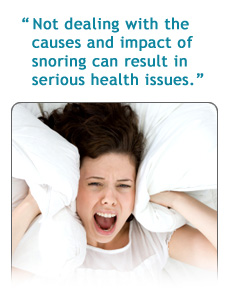 You don’t want to hurt your partner’s feelings by declaring: "Dear, you sound like a grunting pig at night and I’M LOSING MY MIND!" However ignoring snoring isn’t a good idea, either. It can lead to resentment and relationship problems. Moreover, not dealing with the causes and impact of snoring can result in serious health issues.
For example, snoring can be a sign of sleep apnea, a potentially serious disorder in which breathing repeatedly stops and starts. Even if you don’t snore yourself, having your sleep disrupted by a partner’s snoring places you at risk of fatigue and decreased productivity at work, too. A recent study by Mayo Clinic researchers noted that snorers rob their bedmates of at least an hour of nightly sleep. That can result in significantly elevated blood pressure in partners of snorers.
If you snooze through the night without snoring or without hearing sleep disrupting snorts and other odd sounds coming from a partner, consider yourself lucky because snoring is extremely common. It increases as we get older, too.
 "In a population of 30 to 35 year old subjects, 20% of men and 5% of women are found to snore. And by age 60, 65% of men and 40% of women will snore incessantly," points out Jimmy J. Brown, MD, professor in the Medical College of Georgia’s Department of Otolaryngology and chief of the Head and Neck Surgery Section of the Veterans Administration Medical Center in Augusta.
Snoring causes and consequencesWhy is snoring so common? Dr. Brown explains that snoring occurs primarily in humans because of the presence of the oropharynx, a collapsible region of the breathing passage. It developed to facilitate complex speech which explains why people are much more likely to snore than cats or dogs.
"There is limited structural support to this area which allows it to collapse freely and also vibrate during sleep respiration, producing the noise of snoring," Dr. Brown tells Synergy.
He adds that men snore far more than women, although no one knows why. Researchers think older people snore more because they have a more flaccid oropharynx, as well as increased deposits of fat in tissues, than younger folks.
"Snoring that is associated with other symptoms such as having a sore throat, difficulty eating, problem sleeping, or social problems related to the discomfort or distress among bed partners should be addressed," Dr. Brown emphasizes. That’s why it’s important to see your physician about any snoring concerns to see if you should be referred to a sleep disorder specialist.
Sleep apnea and snoringSnoring associated with cessation of breathing or daytime sleepiness suggests obstructive sleep apnea, a serious medical condition. "A significant percent of patients with snoring will harbor sleep apneas," Dr. Brown tells Synergy. "Studies have shown that 72% of subjects seeking treatment for snoring had obstructive sleep apnea."
While it’s easy to make fun of someone’s bizarre grunting and snorting sounds, there’s nothing comical about obstructive sleep apnea. People who snore shouldn’t delay seeing their doctor about the possibility, especially if they have excessive daytime fatigue or partners notice their snoring bedmates seem to have periods at night when they stop breathing.
What makes sleep apnea potentially dangerous? It can cause blood oxygen levels to drop suddenly, increasing blood pressure and putting a strain on the heart. In fact, about half of people with sleep apnea have or develop hypertension, which ups the risk of cardiovascular problems and stroke; they are also more likely to suffer from potentially dangerous abnormal heart rhythms.
 Self-care tips that may reduce or stop snoring and help sleep apnea, too:
- Lose weight. Even the loss of a few extra pounds may help relieve airway constriction.
- Don’t sleep on your back; sleep on your stomach or side instead. Sleeping on your back can cause your tongue and palate to block your airway.
- Try strips taped across the bridge of your nose to encourage nasal instead of mouth breathing. Although these over-the-counter help aids haven’t been subjected to much testing, they may help some snorers.
- Avoid alcohol, sleeping pills and, tranquilizers. They can interfere with breathing by relaxing muscles in the throat.
Medical interventions sleep specialists may recommend for persistent sleep apnea and snoring:
- Positive airway pressure. A machine delivers continuous positive airway pressure, or CPAP (SEE-pap), through a mask placed over your nose while you sleep. This keeps upper airway passages open, preventing apnea and snoring.
- Wearing a mouthpiece. According to the Mayo Clinic, a mouthpiece designed to keep your throat open can sometimes relieve snoring and mild obstructive sleep apnea.
- Uvulopalatopharyngoplasty (UPPP). This surgical procedure removes tissue from the rear of the mouth and top of the throat that may be vibrating and causing you to snore or triggering sleep apnea.
- Stiffening the palate. "For some serious snoring problems, palatal stiffening, which can be accomplished by the surgical placement of plastic rods within the vibratory areas of the palate, may be an option."
|